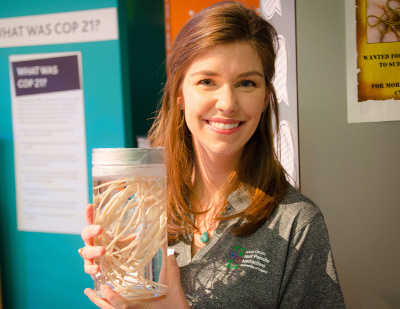
Phone: (403) 394-3909
e-mail: chelsea.matisz@uleth.ca
Lab: EP 1219
Research Interests
I am currently working on a project that combines my interests of immunology, neurobiology, and parasitology. Under the supervision of Dr. Aaron Gruber, I will be exploring the impact of Toxoplasma gondii infection on the rodent host. This protozoan parasite can infect a wide variety of warm-blooded animals—including birds, mammals, and humans—whereupon it can form chronic infections as a cyst in the central nervous system of its host. In fact, approximately 1/3rd of the global population of humans are infected with Toxoplasma. It is hypothesized that through Toxoplasma’s ability to synthesize an enzyme that is a rate-limiting step in the production of dopamine, this parasite can drive massive increases in the synthesis of dopamine in infected rodent—with significant implications in the neuro-behaviour of the host. We intend to explore the behavioural consequences of infection using sensitive behavioural assays. Further, neuro-inflammatory consequences of this infection may enable this parasite to serve as a model for depression in the host. In fact, exposure to the parasite has been linked to schizophrenia in humans. Yet, there is other evidence that exposure to Toxoplasma can actually be neuroprotective in rodent models of Alzheimer’s disease, Parkinson’s Disease, and stroke.
Although are many unknowns regarding Toxoplasma, it is clear this parasite offers an incredible opportunity to learn about host-parasite interactions—both behavioural and immunological.
Biography
I received my undergraduate degree at the University of Lethbridge, where I was first introduced to what would become a life-long interest in parasites. Under the supervision of Dr. Goater, I studied the migration and site selection of a brain- and visceral-encysting parasite of minnows. Following that, I spent some time at the Canadian Water Network evaluating potential threats to Alberta’s source waters, such as those posed by the parasites Giardia and Crytosporidium. I also worked at the Provincial Laboratory (ProvLab) in Edmonton under Dr. Stephanie Yanow, assessing a more sensitive technique to reveal asymptomatic Malaria infection in refugees.
I received my PhD under the co-supervision of Dr. Derek McKay and Dr. Keith Sharkey at the University of Calgary. My work focused on the therapeutic potential of helminth parasites—often termed ‘Helminth Therapy’. During my PhD, my work focused on the use of helminth antigen-treated dendritic cells as a novel cellular immunotherapy in the treatment of a model of Crohn’s Disease in mice.
After my PhD, I worked as a post-doctoral scholar in the Hotchkiss Brain Institute at the University of Calgary under Dr. Sharkey, exploring how interactions with CRH-expressing neurons and microglial cells are altered in the central nucleus of the amygdala when mice are exposed to a model of peripheral inflammation.
Throughout my undergraduate projects, my M.Sc, my PhD, and now my postdoctoral work, I’ve always maintained an interest in parasites, particularly how host-parasite interactions can help to understand host immunology and neuroimmunology. This has led to my current research project, which will combine my interests in immunology, neurobiology, and parasitology.
I am also interested in science writing and science communication. In 2014 I was awarded an Alberta Innovates Media Fellowship, which had me working for the Calgary Eyeopener on CBC Radio for three months, largely on stories related to health and science. I currently maintain a website (www.sciencesoup.net) where I publish my science-related non-fiction essays, when time permits.
Suport
- Alberta Innovates Post Doctoral Fellowship, 2017-2020
Degrees
- Ph.D Gastrointestinal Sciences, with specializations in Parasitology and Immunology, University of Calgary
- M.Sc Biological Sciences/Evolutionary Parasitology, University of Lethbridge
- B.Sc Biological Sciences, University of Lethbridge
Recent Publications
- Matisz, CE, Lopez Faz, B, Thomson, E, Al Rajabi, A, Lopes, F, Terrazas, LI, Wang, A, Sharkey, KA, McKay, DM. 2017. Suppression of colitis by adoptive transfer of helminth antigen-treated dendritic cells required interleukin-4 receptor-a signaling. Scientific Reports, 7, 40631.
- Reyes JL, Lopes F, Leung G, Mancini NL, Matisz CE, Wang A, Thompson. E., Graves, N., Gilleard, J., and McKay, DM. 2016. Treatment with cestode parasite antigens recruit CCR2+ myeloid cells, the adoptive transfer of which ameliorates colitis. Infection and Immunity. 84: 3471-3483.
- Lopes, F, Matisz, CE, Reyes, JL, Jijon, H, Kaplan, G, McKay, DM. 2016. Helminth regulation of immunity: three broad approach to treat colitis. Inflammatory Bowel Disease. 22(10):2499-2512.
- Reyes JL, Fernando MR, Lopes F, Leung G, Mancini NL, Matisz CE, Wang A and McKay DM (2016) IL-22 restrains tapeworm-mediated protection against experimental colitis via regulation of IL-25 expression. PLoS Pathogens. DOI:10.1371/journal.ppat.1005481.
- Matisz CE, Reyes, JL, Sharkey, KA, Wang, A, McKay, DM. 2015. Adoptive transfer of helminth antigen-pulsed dendritic cells suppress colitis in recipients in an adaptive immune dependent mechanism. European Journal of Immunology. 45(11): 3126-3139.
- Matisz, CE, McDougall, JJ, Sharkey, KA, McKay, DM 2011. Helminth parasites and the modulation of joint inflammation. Journal of Parasitology Research, 2011.
- Matisz, CE, Naidu, P., Shokopoles, S, Grice, D, Krinke, V, Brown, S, Kowalewska-Grochowska, K, Houston, S, & Yanow, S. 2010. Real-time PCR in the detection of malaria in asymptomatic refugees. American Journal for Tropical Medicine and Hygiene, 84 (1): 161-165.
- Matisz, CE, Goater, CP, Bray, D. 2010. Density and maturation of rodlet cells in brain tissue of fathead minnows (Pimephales promelas) exposed to trematode cercariae. International Journal for Parasitology. 40, 301-312. Featured on the cover of IJP.
- Matisz, CE., Goater, CP, Bray, D. 2010. Migration and site selection of Ornithodiplostomum ptychocheilus (Trematoda: Digenea) metacercariae in the brain of fathead minnows (Pimephales promelas). Parasitology, 137, 719-731.
- Matisz, CE, Goater, CP. 2010. Migration, site-selection, and development of Ornithodiplostomum sp. Metacercariae (Digenea: Strigeoidea) in fathead minnows (Pimephales promelas). International Journal for Parasitology, 40(13): 1489-1496.